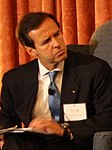Bolivian presidential election, 2005
|
|
|||||||||||||||||||||||||||
|
|||||||||||||||||||||||||||
|
|||||||||||||||||||||||||||
|
|||||||||||||||||||||||||||
Gonzalo Sánchez de Lozada
Revolutionary Nationalist Movement
General elections were held in Bolivia on 18 December 2005. Evo Morales of the Movement for Socialism (MAS) party was elected President of Bolivia with 54% of the vote, the first time a candidate had received an absolute majority since the flawed 1978 elections. Morales was sworn in on 22 January 2006 for a five-year term. The MAS also won a majority of seats in the Chamber of Deputies and emerged as the largest party in the Senate.
Simultaneously voters elected prefects, the highest executive office in each of Bolivia's nine departments. This was the first time the office had been chosen at the ballot box. Subsequently, departmental elections were held separately from national elections, with the next one held in April 2010.
In the early 2000s there were high levels of political instability across the country, including five Presidents in four years. Much of the instability dates back to the economic reforms otherwise known as "shock therapy" implemented by President Gonzalo Sánchez de Lozada whereby many formerly public utilities were privatized.
These reforms ultimately lead to the First Bolivian Gas War in October 2003 where protesters, many of them of indigenous descent, essentially forced the resignation of Sánchez de Lozada. Carlos Mesa temporarily served as interim President.
In his year in office, Mesa held a national referendum on the prospect of the nationalization of the hydrocarbons industry which he claimed to have won. Critics however said that the questions were vague and ambiguous with regard to outright nationalization of the hydrocarbons industry.
...
Wikipedia



